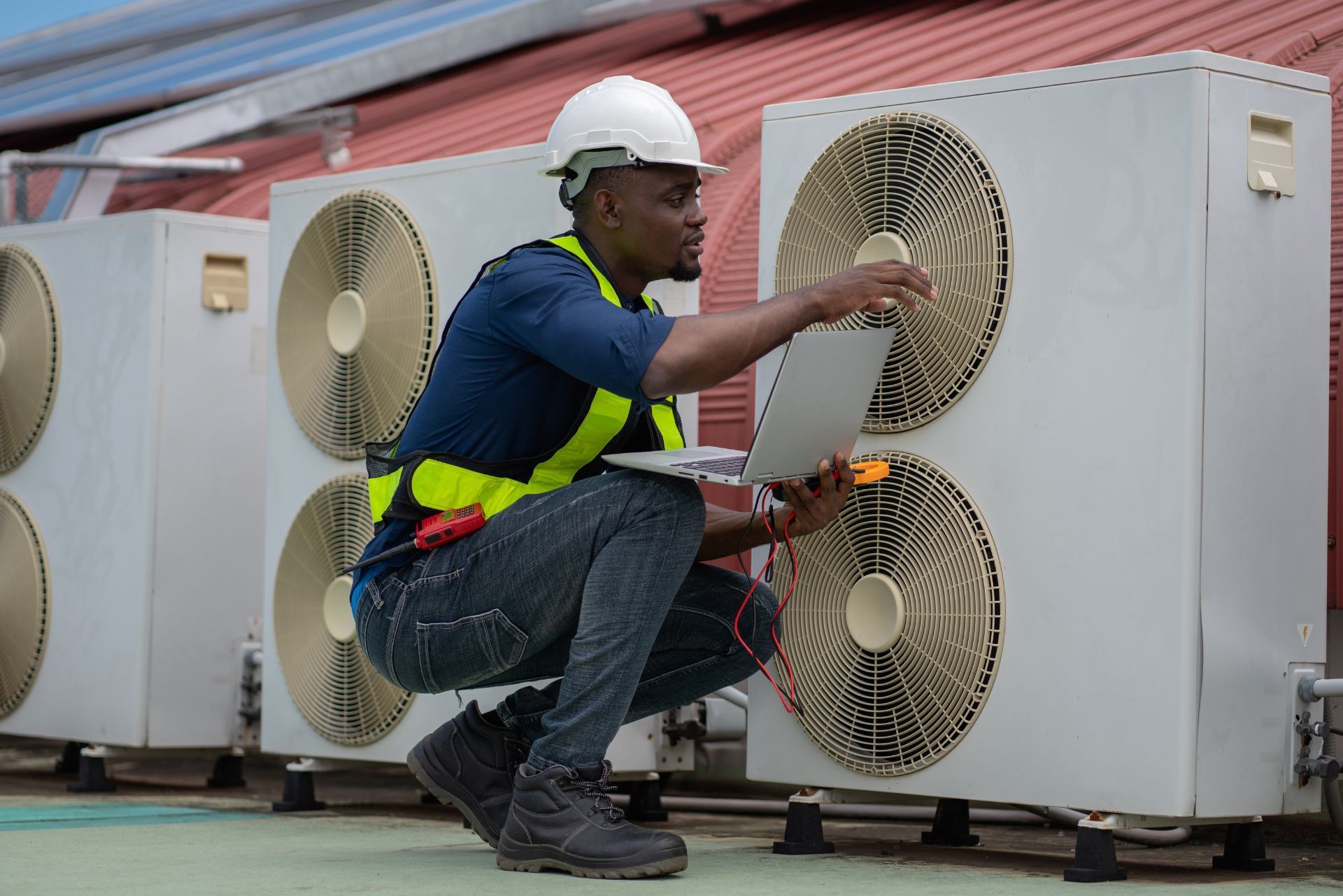Top 3 Recommended Policies

Nevada’s HVAC contractors work in one of the harshest climates in the country, where triple-digit heat and constant demand make reliability essential. Every project carries potential risks, from equipment damage to job site injuries, and even small mistakes can lead to costly claims. Having the right insurance in place is what keeps a growing business protected and prepared for anything. This guide breaks down HVAC contractor insurance in Nevada, explaining what coverage you need, how to manage rising costs, and why local regulations make certain policies especially important. Whether you focus on residential installs in Las Vegas or commercial systems across the state, understanding your insurance options will help you stay secure and competitive in a fast-moving market.
The Growing Nevada HVAC Industry and Its Insurance Implications
Nevada’s HVAC sector is booming, with employment projected to grow by 15%—a rate significantly higher than the national average. This surge reflects the increasing demand for heating and cooling solutions tailored to Nevada’s harsh desert climate.
With nearly 7,462 employees across 956 establishments, the industry is expected to reach $1.9 billion in revenue by 2025, according to IBISWorld. This expansion necessitates robust insurance policies that can keep pace with business scale and complexity.
For HVAC contractors, this means understanding how insurance not only protects against liabilities but also supports business growth. Proper coverage can be a deciding factor for clients who want assurance that their contractors are financially stable and compliant with state regulations.
Moreover, as the industry evolves, contractors are increasingly facing new challenges, such as the integration of smart technology into HVAC systems. This trend requires specialized knowledge and skills, which can lead to higher liability risks. Insurers are beginning to offer tailored policies that address these unique challenges, ensuring that contractors are protected against potential claims arising from the installation of advanced systems. Additionally, as energy efficiency becomes a priority for consumers, HVAC businesses are also exploring eco-friendly solutions, which may require different types of coverage to protect against the risks associated with new technologies and materials.
Furthermore, the competitive landscape is prompting HVAC companies to invest in marketing and customer service enhancements. These investments not only improve client satisfaction but also increase the complexity of operations, making comprehensive insurance coverage even more critical. As contractors expand their services—such as offering maintenance contracts or emergency repairs—they must ensure that their insurance policies adequately cover these new offerings. This proactive approach to risk management can be a significant differentiator in a crowded market, allowing businesses to thrive even amid increasing competition.

Unique Risks Facing Nevada HVAC Contractors
Nevada’s extreme climate puts HVAC systems under constant stress, driving the need for specialized protection. As The Allen Thomas Group points out, “Nevada's extreme climate pushes HVAC systems to their limits year-round, creating unique risks that require smart protection.” This includes exposure to intense heat, dust storms, and rapid temperature fluctuations that can accelerate equipment wear and increase the likelihood of service calls and repairs.
Additionally, the state’s wildfire risk has become a growing concern. In 2023, Nevada saw a staggering 104.8% increase in homeowners insurance applications declined due to wildfire risk, with 4,994 applications turned down compared to 2,439 the previous year. This trend highlights the heightened risk environment contractors operate within, especially when installing or servicing HVAC systems in wildfire-prone areas.
Contractors must be aware that wildfire-related damages can indirectly affect their operations, from supply chain disruptions to increased liability claims. Having insurance that covers wildfire-related incidents, including business interruption and equipment damage, is essential.
Moreover, the geographical diversity of Nevada presents additional challenges. From the arid deserts of Las Vegas to the mountainous regions of Reno, HVAC contractors must adapt their services and equipment to suit varying environmental conditions. For instance, systems installed in high-altitude areas may require specific adjustments to function efficiently due to thinner air and lower temperatures. This necessity for tailored solutions can lead to increased costs and a demand for specialized training for technicians, further complicating the operational landscape.
Furthermore, the regulatory environment in Nevada is continually evolving, which adds another layer of complexity for HVAC contractors. Compliance with local building codes, environmental regulations, and energy efficiency standards is crucial. Contractors must stay informed about these changes to avoid penalties and ensure that their installations meet the latest requirements. This vigilance not only protects their business but also enhances their reputation in a competitive market, where trust and reliability are paramount for attracting and retaining clients.
Essential Insurance Coverages for Nevada HVAC Contractors
Understanding the types of insurance coverage necessary for HVAC contractors in Nevada is crucial for comprehensive protection. Here are the key policies every contractor should consider:
General Liability Insurance
This is the cornerstone of any contractor’s insurance portfolio. It protects against third-party claims of bodily injury, property damage, and personal injury resulting from your business operations. Given the physical nature of HVAC work, accidents can happen on job sites, making this coverage indispensable. Additionally, general liability insurance can also cover legal fees associated with defending against claims, which can be particularly beneficial for small businesses that may not have the financial resources to manage unexpected legal costs.
Workers’ Compensation Insurance
With Nevada’s HVAC contractors typically paying between $1.96 and $3.50 per $100 of payroll for workers' compensation coverage under class code 5190, this insurance is both a legal requirement and a critical safety net. It covers medical expenses and lost wages for employees injured on the job, helping contractors comply with state laws and maintain workforce morale. Moreover, having this coverage can enhance your company's reputation, as it demonstrates a commitment to employee safety and well-being, which can be a significant factor in attracting and retaining skilled workers in a competitive market.
Commercial Auto Insurance
Many HVAC contractors rely on vehicles to transport tools and equipment. Commercial auto insurance covers damages and liability arising from vehicle use in business operations, protecting against costly claims from accidents. This type of insurance is particularly important in Nevada, where the vast distances between job sites can increase the likelihood of vehicle-related incidents. Additionally, some policies may offer coverage for non-owned vehicles, which can be beneficial if employees use their personal cars for business purposes.
Equipment and Tools Coverage
HVAC contractors invest heavily in specialized equipment. Coverage for tools and equipment protects against theft, loss, or damage, ensuring that operations can continue smoothly without financial setbacks. This coverage can be tailored to include specific items such as HVAC units, diagnostic tools, and installation equipment, which can be costly to replace. Furthermore, having this insurance can provide peace of mind, allowing contractors to focus on their work rather than worrying about the potential financial impact of losing essential tools.
Professional Liability Insurance
Also known as errors and omissions insurance, this coverage guards against claims of negligence or faulty workmanship. Given the technical complexity of HVAC systems, this insurance can protect contractors from costly lawsuits related to system failures or improper installations. In Nevada, where the climate can vary dramatically, the risk of system malfunctions increases, making this coverage particularly relevant. It not only protects the contractor financially but also helps maintain client trust and satisfaction, as clients are more likely to feel secure knowing that their contractor is protected against potential errors.
Business Interruption Insurance
In a state vulnerable to natural disasters like wildfires, business interruption insurance is vital. It helps cover lost income and ongoing expenses if your business is temporarily shut down due to covered events, such as wildfire damage. This type of insurance can be a lifesaver for HVAC contractors, allowing them to navigate through tough times without the added stress of financial instability. Additionally, it can cover fixed costs such as rent and utilities, ensuring that the business can resume operations as quickly as possible once the disruption has ended, which is crucial for maintaining long-term viability in a challenging environment.

How Insurance Supports Business Growth and Compliance
Beyond risk protection, insurance plays a strategic role in business development. Nevada’s construction industry, including HVAC contractors, is projected to add over 24,000 jobs through 2026. Contractors with proper insurance coverage are better positioned to win profitable projects, as clients and general contractors increasingly require proof of insurance before awarding contracts.
Maintaining adequate insurance not only ensures compliance with state regulations but also enhances your reputation and credibility. Insurance carriers like The Allen Thomas Group emphasize that contractors who demonstrate financial responsibility and risk management are more likely to secure lucrative contracts in Nevada’s competitive market.
Moreover, insurance can be a differentiator when bidding for projects, signaling professionalism and reliability. It also mitigates the financial impact of unforeseen events, allowing contractors to focus on growth rather than setbacks. For instance, having comprehensive liability insurance can protect contractors from potential lawsuits arising from accidents on job sites, which can be particularly costly and damaging to a business's reputation. This peace of mind enables contractors to take on larger projects without the constant worry of financial ruin from unexpected claims.
In addition to liability coverage, specialized insurance products, such as builder's risk insurance, can further safeguard investments during the construction phase. This type of coverage protects against losses due to damage to the property while under construction, ensuring that contractors do not face crippling losses if an unforeseen event occurs, such as theft or natural disasters. By investing in the right insurance policies, contractors not only protect their current projects but also position themselves for future opportunities, as they can confidently take on new contracts knowing they have a safety net in place.
Addressing Wildfire Risks in Nevada’s Insurance Landscape
Wildfire risk is reshaping Nevada’s insurance environment, affecting both homeowners and contractors. In 2024, 2,527 homes were insured by non-admitted carriers, a number expected to rise as traditional insurers become more cautious due to wildfire exposure. This trend underscores the importance of contractors understanding how wildfire risk influences their insurance needs and costs.
Natural disasters have caused an estimated $79.6 billion in insured property losses nationwide, with nine of the ten costliest wildfires occurring since 2017, according to Nevada Insurance Commissioner Scott Kipper. For HVAC contractors, this means that insurance policies must be carefully reviewed to ensure wildfire-related damages and liabilities are adequately covered.
Contractors working in wildfire-prone areas should consider additional endorsements or specialized policies that address these risks. Proactive risk management, including proper installation practices and equipment maintenance, can also reduce exposure and insurance premiums. Furthermore, staying informed about local fire regulations and participating in community fire prevention initiatives can enhance a contractor's reputation and reliability, potentially attracting more clients who prioritize safety and preparedness.
Additionally, contractors should be aware of the evolving landscape of wildfire risk assessments. Insurers are increasingly utilizing advanced technologies, such as satellite imagery and predictive modeling, to evaluate the fire risk of specific properties. This means that contractors must not only be vigilant in their practices but also adaptable to changing insurance requirements that may arise from new data. Understanding these assessments can help contractors better communicate with clients about the importance of fire-resistant materials and designs, ultimately leading to safer homes and potentially lower insurance costs for homeowners.
Tips for Choosing the Right Insurance Provider
Selecting the right insurance provider is as important as choosing the right coverage. HVAC contractors in Nevada should look for insurers with:
- Experience in the HVAC and construction industries
- Strong financial stability and claims-paying ability
- Customized policy options tailored to Nevada’s unique risks
- Responsive customer service and claims support
Working with a knowledgeable broker or insurance group familiar with Nevada’s market can help contractors navigate complex policy terms and find the best value. Providers like The Allen Thomas Group specialize in contractor insurance and can offer insights into cost-saving measures and coverage enhancements.
Additionally, it’s crucial for HVAC contractors to assess the insurer’s reputation within the industry. Reading reviews and testimonials from other contractors can provide valuable insights into the provider's reliability and customer satisfaction. Engaging in discussions with peers or industry associations can also shed light on which insurance companies have a proven track record of supporting contractors during claims processes, which is often when the quality of service is truly tested.
Moreover, understanding the specific risks associated with HVAC work in Nevada—such as extreme weather conditions or regulatory changes—can help contractors select a provider that not only offers comprehensive coverage but also understands these unique challenges. Some insurers may even provide risk management resources or training that can further enhance safety and compliance, ultimately leading to fewer claims and lower premiums. This proactive approach not only protects the business but also fosters a culture of safety and responsibility within the contracting team.
Conclusion: Protecting Your Nevada HVAC Business for the Future
As Nevada’s HVAC industry continues to grow rapidly, contractors face increasing demands and risks. From extreme climate conditions to wildfire threats, having comprehensive insurance coverage is essential to safeguard your business, employees, and clients.
By understanding the unique challenges of the Nevada market and investing in tailored insurance policies, HVAC contractors can not only protect themselves but also position their businesses for long-term success. Staying informed about industry trends, regulatory changes, and emerging risks will ensure that your insurance remains aligned with your evolving needs.
For more detailed information and personalized insurance solutions, HVAC contractors in Nevada are encouraged to consult with industry experts and trusted providers like
The Allen Thomas Group, who understand the local landscape and can help you navigate the complexities of contractor insurance.
Contact Us
HVACInsure is fully licensed and permitted to sell contractor and commercial insurance in Nevada.
We proudly serve clients throughout Nevada and maintain partnerships with local Nevada insurance carriers to ensure HVAC professionals receive compliant, affordable, and comprehensive coverage that meets project and regulatory requirements.
HVACInsure Focuses on Nevada HVAC Contractor Insurance
Las Vegas – Henderson – Reno – North Las Vegas – Enterprise – Spring Valley – Sunrise Manor – Paradise – Sparks – Carson City – Whitney – Pahrump – Winchester – Summerlin South – Elko – Fernley – Mesquite – Boulder City – Sun Valley – Gardnerville – Dayton – Fallon – Laughlin – Incline Village – Spanish Springs
Frequently Asked Question
Common HVAC Contractor Insurance Questions in Nevada
These FAQs address common contractor questions. As HVACInsure grows, we will update this section with real client experiences and answers.
How does Nevada's extreme desert climate affect my HVAC insurance?
Nevada's heat puts enormous strain on AC systems. We understand the high call volumes, emergency demands, and liability exposure of desert HVAC work.
What coverage do I need for Las Vegas casino and resort work?
Vegas hospitality is demanding. We cover the quick-response requirements, 24/7 service expectations, and high-stakes liability of keeping casinos comfortable.
Do I need special coverage for data center HVAC work?
Nevada's data centers have critical cooling needs. We cover the high-liability exposure and stringent requirements of mission-critical facility work.
What about coverage for new construction in Nevada's growth areas?
Nevada is booming. We cover builder's risk exposure and the completion requirements of new construction HVAC work in development areas.
How do Nevada's licensing requirements affect my insurance?
Nevada requires HVAC contractor licensing through NSCB. We ensure your coverage meets State Contractors Board requirements.
Can I get coverage for both Vegas and Reno markets?
Absolutely. Nevada's markets are distinct. We structure coverage that works in southern Nevada's heat and northern Nevada's mountain climate.

Still have questions?
Can’t find the answer you’re looking for? Please chat to our friendly team!

About The Author: James Jenkins
I’m James Jenkins, Founder and CEO of HVACInsure. I work with HVAC contractors and related trades to simplify insurance and make coverage easier to understand. Every day, I help business owners secure reliable protection, issue certificates quickly, and stay compliant so their teams can keep working safely and confidently.
Recognized by National HVAC Trade Associations
These trusted organizations set best practices and standards that carriers rely on when underwriting HVAC risks.
Membership signifies adherence to HVAC industry standards and contractor best practices.


